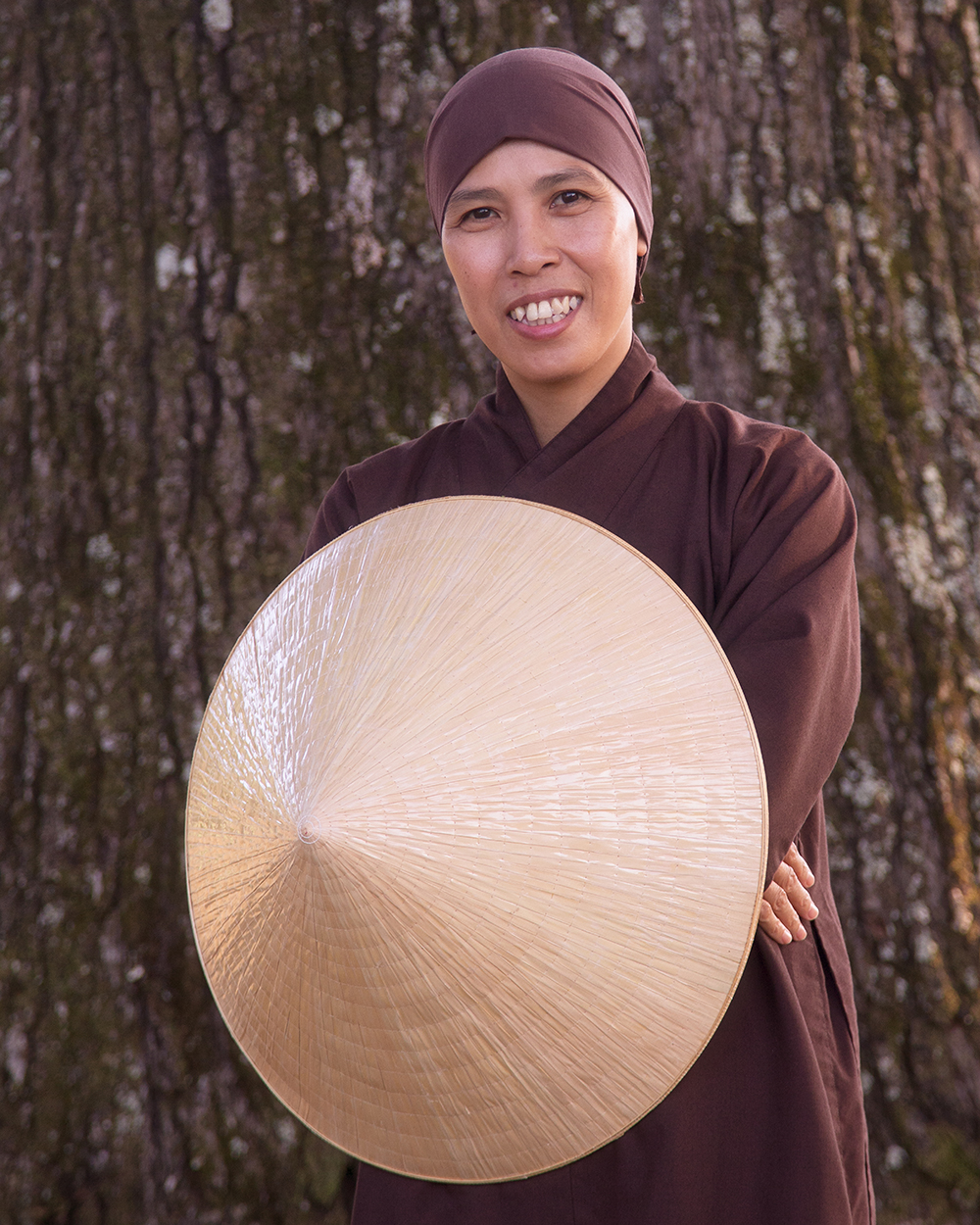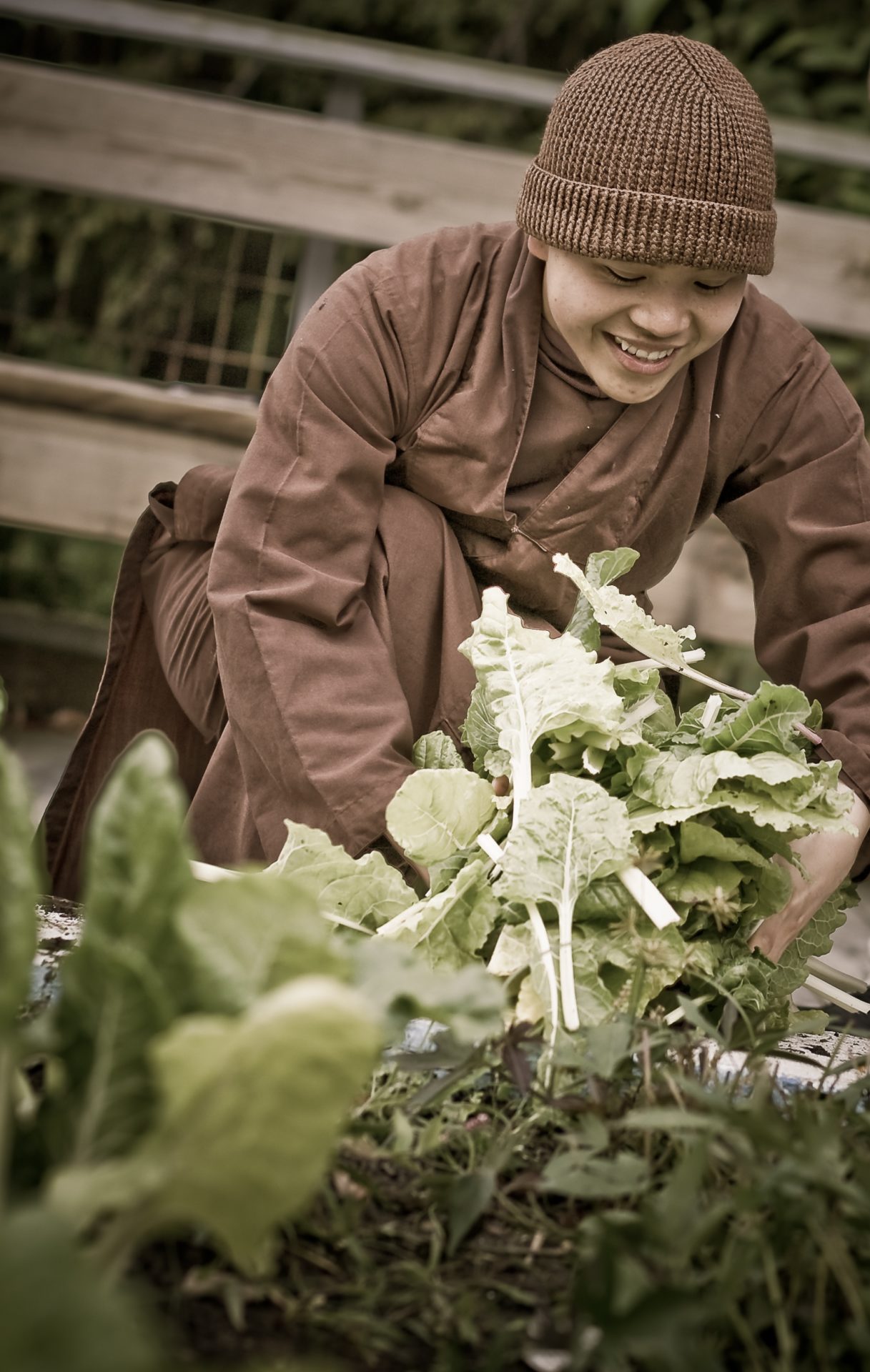By Sister Khai Nghiem
In some Buddhist traditions, monastics might spend many hours each day in sitting meditation. However, Thich Nhat Hanh (Thay) teaches about Engaged, or Applied, Buddhism. This means that we, as monastics, don’t do sitting meditation all day. Instead, we bring continuous meditation to all of the work that we do. For instance, people might think that when we cook, we just cook and we can’t do anything else. But if we cook,
By Sister Khai Nghiem
In some Buddhist traditions, monastics might spend many hours each day in sitting meditation. However, Thich Nhat Hanh (Thay) teaches about Engaged, or Applied, Buddhism. This means that we, as monastics, don’t do sitting meditation all day. Instead, we bring continuous meditation to all of the work that we do. For instance, people might think that when we cook, we just cook and we can’t do anything else. But if we cook, we are aware of each of our movements and we can cook mindfully.
COOKING RETREAT
Recently, we offered our first cooking retreat at Magnolia Grove Monastery. Everyone gathered in the dining hall for the lessons, while the brothers and sisters did the demonstrations. Some people stood the whole time because they really wanted to see the demonstrations; others sat on the floor or sat on chairs. Looking into our lay friends’ eyes, we saw their enthusiasm and eagerness to learn. They commented that even though the brothers and sisters aren’t professional chefs or cooks, they looked quite professional and very mindful.
Two young children also came to learn how to cook. When it was time for volunteers to help wrap tofu with seaweed, these two young friends put on gloves and helped. They said this was something they could do to help their mothers when they returned home.
We didn’t have Dharma sharing during this weekend because the retreat was too short, but I think we did inspire people to become vegetarian—or their eating patterns may have changed. Since people often emphasize the importance of being a vegan or vegetarian, but they don’t say how to do it, we created opportunities for our lay friends to learn how to cook vegetarian food. Of course, they can go on YouTube or buy a cookbook, but they seemed particularly eager to cook because they love our food.
We helped them become more aware of a plant-based diet, which inspired them to consume less meat. That’s a big change! For us, the retreat’s a success if people eat less meat.
If we have another cooking retreat, I’d recommend it to be longer than just a weekend. (The Blue Cliff Monastery cooking retreat lasts three days, and the one at Plum Village lasts a week.) A weekend of practising mindful cooking is fruitful to a certain extent but when our friends have an opportunity to practise mindfulness for a whole week the practice can go much deeper. What we want to teach people is not just how to cook but how to live in mindfulness, because living in mindfulness is what will really transform their lives.
I think all of our practice centers will start offering cooking retreats, because the demand is so high. This year, Magnolia Grove has had five or six retreats. The Order of Interbeing and Happy Teachers Will Change the World retreats had thirty participants, but the cooking retreat had the most participants—sixty. People are very eager to learn how to cook like us.
COOKING WITH TOFU
In 2007, Thay encouraged us not to drink milk or eat eggs. Instead, he wanted us to become vegan because of how cows and chickens are treated. Recently, we saw pictures of cows raised somewhere in Europe. Each cow had a hole put into its digestive tract to take out the toxins and put in food. When cows live under those conditions, they are not happy and their meat is not healthy to eat.
When vegan food tastes good, people find it easier to form a new eating habit. In our monasteries, we use a lot of tofu, and we have found ways to cook it that our lay friends like. For instance, Thay taught me scrambled tofu, and I often made it for him. Now I also make this dish for many of our brothers and sisters, and they seem to enjoy it very much. It’s very easy to do, and it’s very delicious.
EATING WITH MINDFULNESS
When we eat in mindfulness, our eyes are focused on looking with compassion and loving-kindness at those who are with us at the table and on being in touch with the wonderful food on our plate. Our ears are not distracted by sounds. The taste is very different. Usually when we try something new, we only taste the flavor or savor the food for perhaps the first five bites. As practitioners it’s important, however, to prolong the taste of a dish for a long time. We must have that same feeling of “hhmmm, that’s good,” even beyond the first five pieces of tofu, and that’s the challenge. As practitioners of mindfulness we do not just enjoy the first few bites but the whole meal and in this way mindfulness of all our daily actions will be strengthened.
COOKING WITH LOVE
When we cook a dish and many people enjoy it, we also enjoy it. Because if you cook a dish and then thirty minutes later you see that nobody ate it, then you feel sad. But when you make a dish and thirty minutes later it’s all gone, that’s a good sign.
We shouldn’t view cooking as a responsibility, nor should we think that the main purpose of food is to nourish the body. We often think that food is food and the mind is mind, but they are connected. Our body and mind are one, so the food is nourishing the body and the mind.
If there is no love, no compassion, and no mindfulness in the food, then our mind won’t be nourished. For example, a woman may come home from work very tired. Her husband or partner also comes home tired. The children come home from school, also tired. Usually the mother or female partner takes care of the food. Although she’s tired, she still has to go to the kitchen to cook because traditionally that is her responsibility.
Her husband is sitting on the sofa; the children are in their room playing games, and the mother or female partner is cooking by herself. Irritation arises in her. She brings that frustration into the food she’s cooking instead of love. And if there’s no love, then the food is difficult for the family to digest.
That is why we must cook with love when we go into the kitchen. If we are thinking, “Oh, my family should all be helping,” then we need to come back to the breath. We should breathe in and out deeply a few times, before we open the refrigerator and take out the food. In that moment, our kitchen becomes our meditation hall, and our movements carry no frustration. Our movements are gentle. That is the difference between being a practitioner and a non-practitioner.
COOKING WITH THAY
In 2004, I had only been ordained a few months. All the brothers and sisters went to Deer Park Monastery for the Winter Retreat. Sister Hoi Nghiem, who is now the abbess of Lower Hamlet in Plum Village, was Thay’s cook. She invited me to come and help her. I thought to myself, “I am just going to help my elder sister wash the vegetables and do small tasks.”
Sister Hoi Nghiem was quite a Zen master. She didn’t show me anything. She asked me, “Sister Khai Nghiem, can you help to make this Vietnamese pancake, bánh xèo?” I replied, “I am so afraid; I don’t know if I can do it.” Sister Hoi Nghiem said, “You just do it.”
I’d never made Vietnamese pancakes. I didn’t cook at home; my mother cooked the food and I just ate. I loved to eat out, and I loved to learn how other people cooked, but I had never tried to cook at home. I said to myself though, “Okay, my sister is giving me this opportunity, so I will try my best to offer to Thay a tasty Vietnamese pancake.” I thought to myself, “There are so many people around Thay who would love to cook for Thay. I have this opportunity, so I will just do it.” After I made the pancake, I tried it and thought, “It’s good, not too bad.” We know that Thay likes crunchy dishes, so I made the pancake in the Hue style, crispy and crunchy.
I also took a basket and went to the vegetable garden to cut the herbs that you eat with bánh xèo. When it was time for Thay to eat his lunch, we joined him. I just sat and waited for Thay to try my dish. Thay ate and seemed to enjoy it very much.
Then he put the herbs in, too. He was chewing, and then he got up and went to the restroom. A few minutes later Thay came out, and as he was walking back into the room, it looked like he had gone to brush his teeth. Then Thay asked me, “Sister Khai Nghiem, don’t you know that this is an herb Thay cannot eat?” It has a smell that is very difficult for some people to handle. It’s just like durian. Thay can’t stand the smell, and he can’t eat it. I was very disappointed with myself, and I felt I’d just made a big mistake.
From that day on, I tried to become a good cook for Thay, but I still made mistakes. One time when I was cooking for Thay, I was listening to music at the same time. Thay passed by and I didn’t hear him, so I didn’t have time to turn off the music. Thay asked me, “What are you doing?” I said, “I’m listening to music.” But Thay was really asking, “Are you cooking or are you listening to music?” So I thought, “Oh no, I forgot. I’m not really cooking because I’m listening to music, too.” Since then, I have not listened to music and I also do not talk so much as I cook because if we are cooking and talking at the same time, our mindfulness is also diminished.
Another lesson Thay taught was about interbeing. One time Thay invited me to into his hut, where he was cooking. He asked me to come and help him to cut some vegetables. Thay asked me, “Sister Khai Nghiem, in your hands, don’t you also have your mother’s hands?” It was a reminder to practice mindfulness, and to remember that I learned how to cook from my mother; she transmitted her skills and talents to me. So from that day on, whenever somebody compliments me, “Your dish is so good; you cook so well,” I know that it’s not just about me; it’s also about my mother.
Interview transcribed by Adam Victorino.

Sister Khai Nghiem (True Revelation) currently lives in Magnolia Grove Monastery and has been a nun for fourteen years. She was one of the main cooks for Thay for six years in Plum Village and while Thay was traveling to lead retreats in Vietnam, Germany, Italy. She was a well loved teacher by her students before becoming a nun.

